
“Buddy” is disappointing for a number of reasons, chief among them the fact that no one in it ever gets torn apart by an angry gorilla. Very few movies do feature such incidents, of course, and while that is lamentable, it’s understandable. A gorilla attack wouldn’t make any sense in, say, “The Social Network.” But “Buddy” actually HAS a gorilla as one of its main characters, and the gorilla is forced to wear clothes and use silverware and engage with human beings, and it would seem only a matter of time before it gets fed up and starts ripping the limbs off its captors.
And yet this never happens.
Listen, movie. Why would we sit down to watch a film about a delusional rich person who treats wild animals like playthings if not to see her suffer terribly for her arrogance? What other reason could you possibly have for existing if not to depict nature’s gruesome revenge? It’s time to take a long, hard look at yourself, movie, and consider whether you serve any purpose at all.
Loosely based on a true story, “Buddy” stars Rene Russo as Trudy Lintz, a super-rich lady in Brooklyn who amuses herself during the Great Depression by hoarding animals in her mansion. Periods of economic disaster are very boring for rich people, so they have to do something to pass the time. Trudy has a bunch of dogs, horses, birds, and other normal pets, along with a pair of chimpanzees that she considers her children. She makes them sit at the dinner table and eat with cutlery. She also dresses them up and takes them to the movies with her. When people look at her like she’s insane, and question the wisdom of bringing jungle primates into public cinemas, she laughs merrily at their concerns and goes right on ahead with her business. The film begins with her telling us that when she was a kid, she fantasized about being queen of the jungle. “I loved that world, where the creatures ran wild and only I could tame them,” she says.
In other words, “Buddy” is about a crazy idiot who foists her nutty worldview on everyone around her, and gets away with it because she’s rich. Next thing you know she’ll be starting her own network and giving away cars to everyone.
You might worry that an eccentric socialite wouldn’t be able to care for chimpanzees, but you can relax. Trudy has a cook and a butler, and they are well qualified. When the two chimps stand on the kitchen counters and throw a hatchet back and forth at one another, the household staff handles the situation with aplomb. It’s all in a day’s work at Lunatic Millionaire Manor!
Trudy is also enabled by her doctor husband, Bill, who finds her dangerous obsession with wildlife to be charming. (Bill is played by Robbie Coltrane, because for sure Rene Russo married Hagrid.) Every time you think it’s gone too far and Bill is surely going to talk some sense into his dotty wife, he doesn’t. And again, you feel like this movie really needs to end with Bill sobbing over the mangled remains of his gorilla-stomped wife.
Oh, right, the gorilla. One day Trudy gets word that the local zoo’s baby gorilla is about to die of pneumonia, so she takes it home and nurses it back to health. (I guess the zoo was going to just toss it out with the trash.) She names the gorilla Buddy. Buddy quickly grows from a creepy animatronic puppet to a person in a gorilla costume. While the movie’s chimpanzees are played by actual chimps, at no point do any real gorillas figure into the equation. They are an endangered species, and not many of them are professional actors (unlike chimpanzees, which by nature are total attention whores).
Scientists didn’t know a lot about gorillas in the early 1930s, as the “Gorillas in the Mist” lady wasn’t around yet to tell them. In the movie, Trudy decides that she might as well be a researcher her own self, even though her expertise is pretty much limited to knowing that gorillas and chimps are apes and not monkeys. This would make her better suited to be a “Jeopardy!” contestant than a primatologist, but “Jeopardy!” wasn’t around yet either.
When a real scientist asks what she intends to do with Buddy, Trudy replies, “To raise him as much as possible like a human child!” “Preposterous!” says the scientist, who unfortunately is played by Paul Reubens, which makes it hard to take him seriously. In addition to “preposterous” he might have added “irresponsible,” “reckless,” and “ill-advised,” but it wouldn’t have mattered. As far as the movie is concerned, since Trudy is the heroine, everything she says and does is right, and anyone who opposes her is a villain who gets arrested at disreputable theaters in Florida.
Ratcheting up the film’s discomfort level is the inescapable fact that Buddy is in love with Trudy. When she and Bill go out for an evening, Buddy escapes from his enclosure, goes to their bedroom, and dances around with one of Trudy’s dresses, his eyes closed blissfully as he inhales her scent. Decent people find this sort of behavior unsettling; Trudy finds it charming.
Trudy is invited to bring her chimps to the 1933 World’s Fair in Chicago, and against the advice of every sane person who has contact with her, she takes Buddy, too. Buddy has never been around more than four or five people at a time. How will he react to hundreds of them? Trudy is amused that anyone would even imagine there might be a problem, laughing blithely when Bill gently expresses his concerns. (Bill quickly backs down. Don’t get on the bad side of someone who controls a gorilla, I guess.) Then, when Buddy gets out of his cage and goes romping through the World’s Fair as crowds flee in panic, you think: FINALLY. Now we’re getting to the good stuff. Buddy is bound to hurt somebody, even if only accidentally, and Trudy will be forced to send him to a zoo or a wildlife preserve, or at the very least military school.
Alas, Buddy is recaptured without incident (except insofar as “terrifying hundreds of fairgoers” constitutes an “incident”), and Trudy’s lifelong effort to avoid learning from her mistakes continues unabated. But when they return to Brooklyn, Buddy is sullen and distant. He was traumatized by having all those people afraid of him at the fair. He’s damaged goods now, no longer the vibrant and charismatic gorilla he once was. One night he — well, there’s no better way to put it. He goes ape. He goes ape and starts wrecking Trudy and Bill’s house. Trudy has always been able to calm the beast before, but not this time. They call the police, who arrive with guns drawn.
“You mustn’t shoot!” Trudy cries.
“Only if we have to, Mrs. Lintz!” an officer responds.
“By my signal! Do you hear me? On my signal ONLY!”
This is emblematic of Trudy’s whole shtick, which is that she makes everyone adhere to her way of thinking at all times, even when her way of thinking means you shouldn’t use force to subdue a rampaging gorilla. “I am rich and eccentric!” she seems to say. “Bow to my every whim!” Whether you’re a scientist, a cop, or a movie-theater owner, she’ll tell you how to do your business, regardless of how much expertise she has. She’s like one of those college students who think they know how to fix the world’s political problems because they read “Atlas Shrugged.”
And anyway, she’s the one who called the police in the first place. What did she think they were going to do, threaten Buddy with arrest? Give him one of those “scared straight” lectures? You don’t want your primate boyfriend being shot by the cops, don’t call the cops when your primate boyfriend is tearing your house apart. Even the people on “Jerry Springer” know that.
Buddy calms down without being shot, though, and finally Trudy seems to grasp that it may be unwise to keep a gorilla, no matter how docile he normally is, in a fancy house. Things end on a bittersweet note. Trudy must say goodbye to her friend as he goes to live with other gorillas at a wildlife preserve, but she gives him her red dress as a souvenir, and I’m not even making that up. Won’t the other gorillas make fun of him for swanning around holding a dress and recalling his lost love? Yes, yes they will. And then, at last, maybe we’ll get to see some violence.
— Film.com





